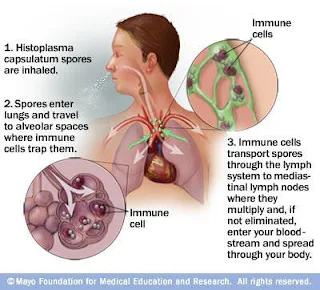Histoplasmosis is an infection caused by a fungus called Histoplasma. The fungus lives in the environment, particularly in soil that contains large amounts of bird or bat droppings. Endemic areas include central and eastern United States, particularly areas around the Ohio and Mississippi River Valleys, as well as parts of Central and South America, Africa, Asia, and Australia.
Symptoms include:
- Fever
- Cough
- Fatigue
- Chills
- Headache
- Chest pain
- Body aches
Transmission
People can get histoplasmosis after breathing in the microscopic fungal spores from the air. Histoplasmosis can’t spread from the lungs between people or between people and animals. Lab Tests & Specimen Info
Test*
|
Specimen
|
Immunodiffusion
antibody |
Serum
|
Culture
|
Blood, Sputum
|
Standard precautions are recommended in healthcare settings.
Prevention for Patients
In areas where Histoplasma is known to live, people who have weakened immune systems should avoid doing activities that are known to be associated with getting histoplasmosis, including:
In areas where Histoplasma is known to live, people who have weakened immune systems should avoid doing activities that are known to be associated with getting histoplasmosis, including:
- Disturbing material (for example, digging in soil or chopping wood) where there are bird or bat droppings
- Cleaning chicken coops
- Exploring caves
- Cleaning, remodeling, or tearing down old buildings
Large amounts of bird or bat droppings should be cleaned up by professional companies that specialize in the removal of hazardous waste.



No comments:
Post a Comment